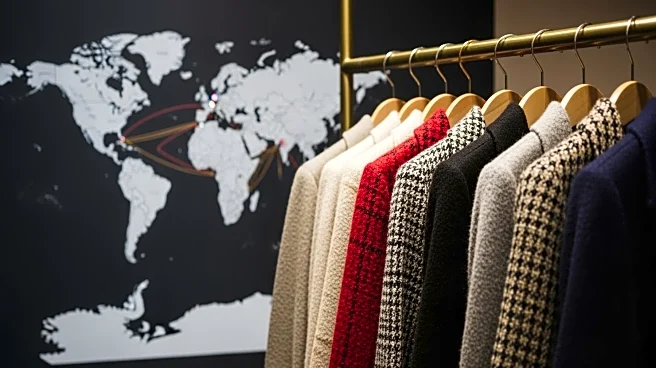What's Happening?
France has seen a significant increase in its coat imports, with a rise of 18% in volume and 7% in value, reaching $1.1 billion in the first seven months of the year compared to the same period last year.
This growth in imports is attributed to a decline in average unit prices, which fell by 3.5% to $22.50 per piece. The decrease in prices is driven by consumer preferences for lighter outerwear, promotional discounts by retailers, and increased sourcing from low-cost Asian markets. The data, sourced from TexPro, highlights a shift in the apparel trade dynamics, with France's import strategy focusing on cost-effective sourcing.
Why It's Important?
The increase in France's coat imports has broader implications for the global apparel industry. As France sources more from low-cost Asian markets, it could influence pricing strategies and competitive dynamics among apparel exporters. This trend may pressure European manufacturers to innovate or reduce costs to maintain market share. Additionally, the shift towards lighter outerwear reflects changing consumer preferences, which could impact design and production strategies in the apparel sector. Retailers may need to adjust their inventory and marketing strategies to align with these evolving consumer demands.
What's Next?
The continued growth in France's coat imports may lead to further adjustments in global apparel trade patterns. Retailers and manufacturers might explore new sourcing strategies or invest in technology to enhance efficiency and reduce costs. Additionally, the focus on lighter outerwear could drive innovation in fabric technology and design. Stakeholders in the apparel industry will likely monitor these trends closely to adapt their business models and maintain competitiveness in the evolving market landscape.
Beyond the Headlines
The shift in France's coat import strategy could have ethical and environmental implications. Increased sourcing from low-cost markets may raise concerns about labor practices and sustainability in the apparel supply chain. As consumer awareness of ethical sourcing grows, companies may face pressure to ensure fair labor conditions and environmentally friendly practices. This could lead to increased transparency and accountability in the global apparel industry.









